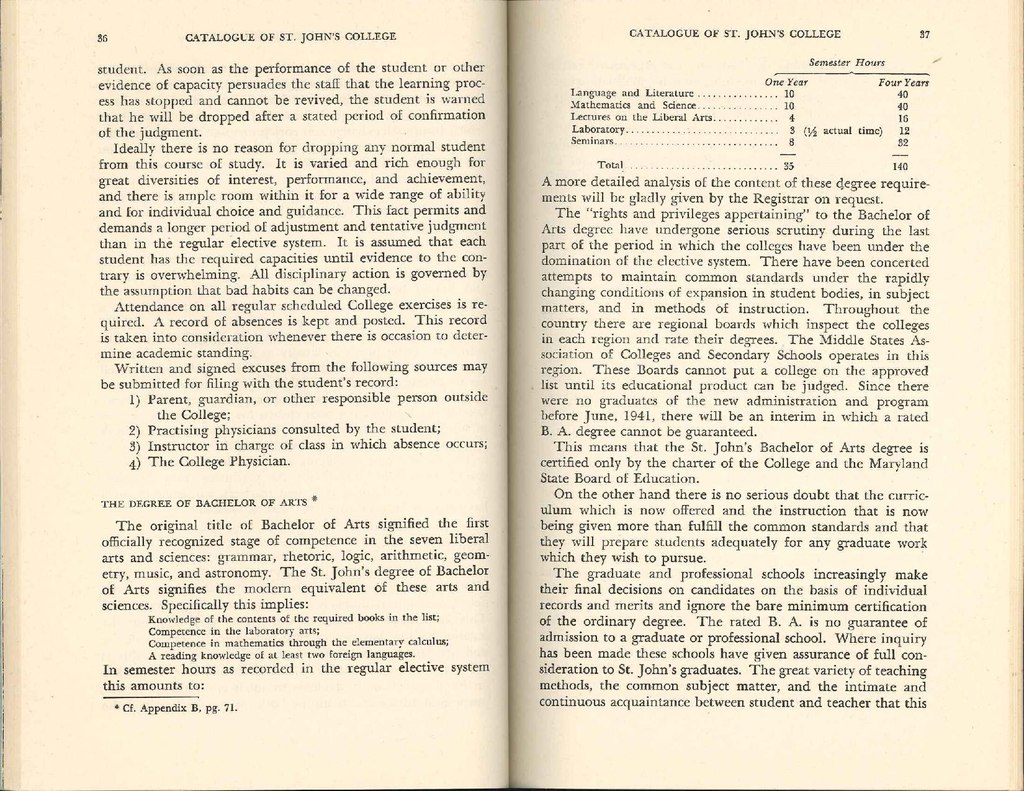student. As soon as the performance of the student or other evidence of capacity persuades the staff that the learning process has stopped and cannot be revived, the student is warned that he will be dropped after a stated period of confirmation of the judgment.
Ideally there is no reason for dropping any normal student from this course of study. It is varied and rich enough for great diversities of interest, performance, and achievement, and there is ample room within it for a wide range of ability and for individual choice and guidance. This fact permits and demands a longer period of adjustment and tentative judgment than in the regular elective system. It is assumed that each student has the required capacities until evidence to the contrary is overwhelming. All disciplinary action is governed by the assumption that bad habits can be changed.
Attendance on all regular scheduled College exercises is required. A record of absences is kept and posted. This record is taken into consideration whenever there is occasion to determine academic standing.
Written and signed excuses from the following sources may be submitted for filing with the student's record:
- Parent, guardian, or other responsible person outside the College;
- Practising physicians consulted by the student;
- Instructor in charge of class in which absence occurs;
- The College Physician.
the degree of bachelor of arts[1]
The original title of Bachelor of Arts signified the first officially recognized stage of competence in the seven liberal arts and sciences: grammar, rhetoric, logic, arithmetic, geometry, music, and astronomy. The St. John's degree of Bachelor of Arts signifies the modern equivalent of these arts and sciences. Specifically this implies:
- Knowledge of the contents of the required books in the list;
- Competence in the laboratory arts;
- Competence in mathematics through the elementary calculus;
- A reading knowledge of at least two foreign languages;
In semester hours as recorded in the regular elective system this amounts to:
| Seminar Hours | |||||
| One Year | Four Years | ||||
| Language and Literature | 10 | 40 | |||
| Mathematics and Science | 10 | 40 | |||
| Lectures on the Liberal Arts | 4 | 16 | |||
| Laboratory | 3 | (½ actual time) | 12 | ||
| Seminar | 8 | 32 | |||
| — | — | ||||
| Total | 35 | 140 |
A more detailed analysis of the content of these degree requirements will be gladly given by the Registrar on request.
The "rights and privileges appertaining" to the Bachelor of Arts degree have undergone serious scrutiny during the last part of the period in which the colleges have been under the domination of the elective system. There have been concerted attempts to maintain common standards under the rapidly changing conditions of expansion in student bodies, in subject matters, and in methods of instruction. Throughout the country there are regional boards which inspect the colleges in each region and rate their degrees. The Middle States Association of Colleges and Secondary Schools operates in this region. These Boards cannot put a college on the approved list until its educational product can be judged. Since there were no graduates of the new administration and program before June, 1941, there will be an interim in which a rated B. A. degree cannot be guaranteed.
This means that the St. John's Bachelor of Arts degree is certified only by the charter of the College and the Maryland State Board of Education.
On the other hand there is no serious doubt that the curriculum which is now offered and the instruction that is now being given more than fulfill the common standards and that they will prepare students adequately for any graduate work which they wish to pursue.
The graduate and professional schools increasingly make their final decisions on candidates on the basis of individual records and merits and ignore the bare minimum certification of the ordinary degree. The rated B. A. is no guarantee of admission to a graduate or professional school. Where inquiry has been made these schools have given assurance of full consideration to St. John's graduates. The great variety of teaching methods, the common subject matter, and the intimate and continuous acquaintance between student and teacher that this
- ↑ Cf. Appendix B. pg. 71.
